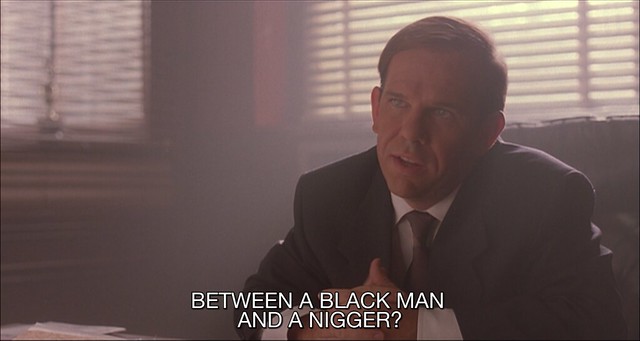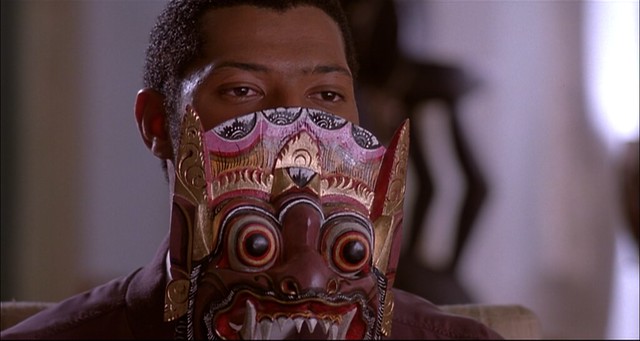
 As far as the 90s hood films go, Bill Duke's Deep Cover cuts pretty deep. Maybe I shouldn't group the film with hood films, which in turn are message films, usually dealing with in and out of 'community'. But that's for another review. Deep Cover is a cold hard noir. I guess we can group it with Rage in Harlem (also directed by Duke, based on Harlem noir writer Chester Himes), One False Move and Glass Shield, all release around the same time.
As far as the 90s hood films go, Bill Duke's Deep Cover cuts pretty deep. Maybe I shouldn't group the film with hood films, which in turn are message films, usually dealing with in and out of 'community'. But that's for another review. Deep Cover is a cold hard noir. I guess we can group it with Rage in Harlem (also directed by Duke, based on Harlem noir writer Chester Himes), One False Move and Glass Shield, all release around the same time.
Deep Cover poses itself as an interesting case study in black film noir. African American film scholar Michael Gillespie makes an interesting observation about noir, a genre film that grew out of post-war white angst as it rose from surrealism and existentialism coupled with hard-boiled literature. This world, filled with vice, moral ambiguity and misogyny. What takes place in there is the criminal undertaking of abject whites with the racial undertones of invisible black bodies. What black film noir does is casting a light on black people.
Stevens/Hull (Lawrence Fishburne) a Cincinnati cop with daddy issues, is recruited to go undercover to bring down a drug kingpin in LA, when he coolly gave the just right answer when a white federal agent Carver (Charles Martin Smith)'s asks a loaded question, "How can you tell between a black man and a nigger?" "Only a nigger would even consider answering that question." From the get-go, Deep Cover delves into Fishburne's conflicted character as a cop with 'all the personality traits of a criminal'. Once on the streets of LA, he quickly establishes himself in the drug dealing business. He befriends with a drug dealing defense attorney Jason (Jeff Goldblum) who has a fetishistic attachment for African American and indulges himself in the seedy world of Latino run drug-dealing business. An LA cop Taft (Clarence Williams III) is on their trail. Taft is a bible thumping father figure.
Even though there is a rapport between Hull and Jason, the tight script doesn't allow their bromance to the level of interracial duo in buddy cop movies. It's strictly business for Jason and for Hull, it's sheer necessity. In order to stop the flow of drugs coming in to the black neighborhood, Hull will need to not only deal, but also kill (with Carver's blessings) not to blow his cover. After taking down the expected targets of the police investigation, Hull goes for the top man of the drug organization, Guzman, a Latin American diplomat with ties to the high level US politicians - after all, this is the man is responsible for funneling drugs into the neighborhood of LA. But Carver pulls the plug on the operation. It's done. The State Department is taking over. Guzman can't be touched. The Man used Hull and screwed him.
Jason, blinded by his ambition as a big time drug kingpin, suggests pitching his synthetic drug idea to Guzman for the funding. So the trap is set at a harbor at night. With Taft on his trail and Jason not suspecting Hull to be a cop, and Hull still doing what's right even though his job is over converge.
Deep Cover is an interesting, above average noir with a black protagonist. Duke and co uses a genre to shed a light on the complex African American experiences.